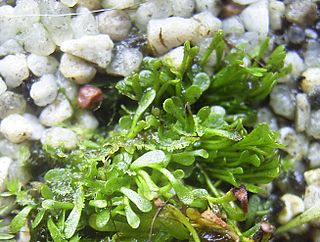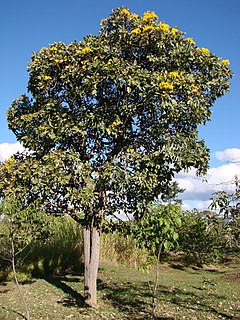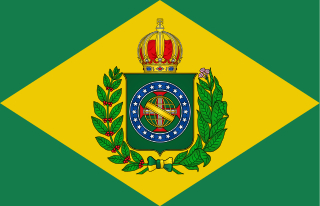
The Lei Áurea, adopted on May 13, 1888, was the law that abolished slavery in Brazil. It was signed by Isabel, Princess Imperial of Brazil (1846–1921), an opponent of slavery, who acted as regent to Emperor Pedro II, who was in Europe.

The cruzado was the currency of Brazil from 1986 to 1989. It replaced the second cruzeiro in 1986, at a rate of 1 cruzado = 1000 cruzeiros (novos) and was replaced in 1989 by the cruzado novo at a rate of 1000 cruzados = 1 cruzado novo.

Justicia is a genus of flowering plants in the family Acanthaceae. It is the largest genus within the family, encompassing around 700 species with hundreds more as yet unresolved. They are native to tropical to warm temperate regions of the Americas, India and Africa. The genus serves as host to many butterfly species, such as Anartia fatima. Common names include water-willow and shrimp plant, the latter from the inflorescences, which resemble a shrimp in some species. The generic name honours Scottish horticulturist James Justice (1698–1763). They are closely related to Pachystachys.

Genlisea aurea is one of the largest carnivorous species in the genus Genlisea. It has pale bundles of root-like organs up to about 15 cm long under ground that attract, trap, and digest protozoans. These organs are subterranean leaves, which lack chlorophyll. G. aurea is endemic to Brazil, where it grows with several other species of Genlisea. It possesses an exceptionally small genome for a flowering plant.

The House of Sand is a 2005 Brazilian film directed by Andrucha Waddington. It stars real life mother and daughter Fernanda Montenegro and Fernanda Torres. The House of Sand was filmed entirely on the coast of northern Brazil, inside Lençóis Maranhenses National Park.

Vitória da Conquista is a municipality in Bahia, Brazil, that has a population of approximately 341,000 people as of 2020, according to the IBGE. It is the third largest city in the state of Bahia, after Salvador and Feira de Santana respectively.

5-Bromo-DMT (5-bromo-N,N-dimethyltryptamine) is a psychedelic brominated indole alkaloid found in the sponges Smenospongia aurea and Smenospongia echina, as well as in Verongula rigida alongside 5,6-Dibromo-DMT and seven other alkaloids. It is the 5-bromo derivative of DMT, a psychedelic found in many plants and animals.

Tabebuia aurea is a species of Tabebuia native to South America in Suriname, Brazil, eastern Bolivia, Peru, Paraguay, and northern Argentina. The common English name Caribbean trumpet tree is misleading, as it is not native to the Caribbean. It is also known as the silver trumpet tree, and tree of gold.

Justicia pectoralis is an herb in the family Acanthaceae. This water-willow is widely known as tilo in Latin America and in Cuba. In Haiti it is called chapantye and zeb chapantyè on Dominica and Martinique. Other folk names are freshcut, chambácarpintero ("carpenter"), té criollo, curia, death-angel, masha-hari, or "piri piri". This species was described by Nikolaus Joseph von Jacquin in 1760, who provided additional data in 1763. A well-marked variety, var. stenophylla, was described by Emery Clarence Leonard in 1958.

Áurea is a municipality in the state of Rio Grande do Sul, Brazil. As of 2020, the estimated population was 3,535.
João and the knife is a 1972 Brazilian drama film directed by Dutch filmmaker George Sluizer. It was entered into the 22nd Berlin International Film Festival. The film was also selected as the Brazilian entry for the Best Foreign Language Film at the 46th Academy Awards, but was not accepted as a nominee.
Aurea, golden in Latin, may refer to:

Nausithoe aurea is a species of crown jellyfish found off the southeastern coast of Brazil. The central disc has been measured to be 10.5 mm. N. aurea is transparent with yellow and brown spots located around the gonads. N. aurea can reproduce either asexually by strobilation or sexually. Either ephyrae or planuloids may be produced by strobilation; only ephyrae can produce the medusal form. Strobilation can be induced to occur when food is abundant. In polyps, a large availability of food leads to strobilation if it is not regulated.

Justicia carnea, with common names including Brazilian plume flower, Brazilian-plume, flamingo flower, and jacobinia — is a flowering plant in the family Acanthaceae. Commonly called Hospital Too Far or Blood of Jesus. Local people use it medicinally for anemia. The resultant liquid after boiling is usually crimson red.

Events in the year 1888 in Brazil.

Jarbas Vasconcelos is a Brazilian politician and lawyer. He represented Pernambuco in the Federal Senate from 2007 to 2015. Previously, he was governor of Pernambuco from 1999 to 2006. He is a member of the Brazilian Democratic Movement Party.
Ariel Enrique Holan is an Argentine professional football manager, currently in charge of Brazilian club Santos.
Wagner Leonardo Calvelo de Souza, known as Wagner Leonardo, Wagner Palha or simply Wagner, is a Brazilian footballer who plays for Santos. Mainly a central defender, he can also play as a defensive midfielder.















